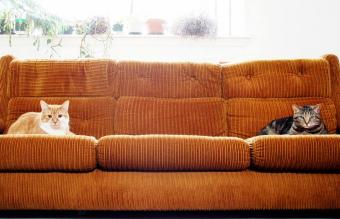
Kitty-proof your home with a few cat safety tips to make sure you have a safe environment for you and your kitty to live together. From hiding dangerous electrical cords to keeping medications out of kitty's reach, these tips are easy to put into action right now.
Cat Safety
Not every cat will get into every kind of mischief, but it's generally a good idea to watch out for a few specific things that could do your kitty harm.
Hide Your Cords
Just like dogs, some cats love to chew, and if they chew through an electrical cord this could start a fire or hurt your cat. Purchase covers for your cords, hide them, or try one of these quick fixes.
- Apply a pasty mixture of cayenne pepper, hot pepper sauce, nail-biting nail polish or orange/lemon peel.
- Put cardboard tubing around the cords and keep them in an organized bundle.
Plants
Many plants are toxic to cats and dogs. Either avoid bringing these into the home, or try hanging them from a hook on the ceiling away from any shelves or counters the cat could jump from. Common poisonous plants include:
- Azaleas
- Birds of Paradise
- Buttercups
- Caladium
- Carolina Jess amine
- Castor bean
- Christmas Berry
- Day Lily
- Dumb cane Easter Lily
- Elephant Ear
- English Ivy
- Holly
- Hyacinth
- Irises (the leaves and the roots are dangerous)
- Lantana
- Mistletoe
- Morning glories
- Narcissus
- Philodendrons
- Poinsettias
- Wisteria
- Yellow Oleander
To prevent your cat from digging in the dirt around your houseplants, go to your local craft store and buy a few pieces of plastic needlepoint mesh. Cut it to fit the pot, with a slit and an opening for the plant. Place it on top of the dirt.
Food and Medicine

Many of things people eat each day are poisonous to cats. Make sure you keep the following off counters and out of reach of your curious feline.
- Grapes
- Onions
- Garlic
- Chocolate
- Aspirin
- Tylenol
While some cats can digest milk and beef products, many others are intolerant. Keep your food out of reach at all times just to be safe and discourage bad habits.
Curtains and Screens
Cats like to climb, so be careful with what kinds of curtains or draperies that you hang. A cat's claws can become snagged in a loose weave drape or screen, causing the cat to pull at an awkward angle to free himself. This could cause a minor muscle injury, as well as damage to your window treatment. If you really want to play it safe, use vertical blinds - they cannot get stuck on them, and you won't find holes and snags all over them. For safety's sake, make sure that the pull-cord is not a loop - cut it so there are two strings, so neither your cat nor your child will inadvertently get it caught around their neck.
Carpet
Cats like to sharpen their nails on things like carpeting. While this is also damaging to the rug, carpets with loose weaves thin piles may catch and hold their claws. This could trap the cat, causing him to panic and potentially injure himself to get a way. Young kittens may also try to get beneath throw rugs, where they may be stepped on or trapped. Use a very tight weave for shag or deep pile carpets whenever possible and pin down throw rug corners to prevent your kitten from slipping beneath them.
Plastic Bags and Buckets
Cats love to sleep inside bags, buckets and baskets as well as cardboard boxes. Never leave an open plastic bag around where you cat could become trapped and suffocate. Likewise, keep lids on buckets to keep your cat out.
The Garbage Can
The smells and tidbits in the garbage can continually peak your cat's interest, which can be hazardous if things like chicken bones, grapes or onions are thrown inside. Fit your can with a lid or keep it under the sink to avoid problems.
Human Safety
Living with cats can be an extremely beneficial thing for both of you. There are some hazards, however, that your cat could pass along to you. Play it safe with these tips.
Litter Box Care
The litter box may be the way your cat keeps the messes in the house to a minimum, but can also be the breeding ground for some potentially harmful parasites. Toxoplasmosis is a parasite that cats can pick up from mice they have eaten. The parasite is then excreted in the cat's feces; always wash your hands after cleaning the litter box and keep the litter box as clean as possible to avoid transmitting this disease.
Take Care in the Dark
Cats like to lay stretched out on the ground, and may not move when they see you coming. If your cat is dark colored or black, take care when moving around in the dark so you don't step on or trip over your cat.
Flea and Tick Care
Cats can bring fleas and ticks into the home, which can multiply around areas such as litter boxes and cat beds. While this is uncomfortable for your cat, it can also be uncomfortable for you. Treat your cat with a monthly flea and tick medicine to avoid brining these pests into your home.
Nail Care
A cat uses her nails to defend herself and to give herself purchase when jumping off of things. Keep her nails trimmed properly to avoid being scratched either by accident or from an angry feline friend.
Use Common Sense
Many of the things your cat could get into in your home may be right out in front of you. Use common sense when you kitty proof your home to help prevent potential problems for you both.







